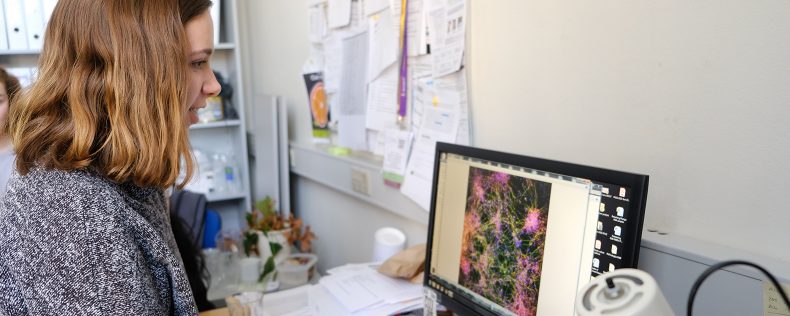Blanca Aldana’s laboratory (NeuroMet) focuses on the study of brain energy and neurotransmitter metabolism and its impact on neurodegenerative disorders such as Alzheimer’s disease and frontotemporal dementia. Presently, the investigations in NeuroMet take advantage of diverse brain-derived preparations including cell cultures of neurons and astrocytes, brain slices, cutting-edge, cell-based model systems such as hiPSC-brain cells and brain organoids, and high-output biochemical methodologies for dynamic metabolic mapping and for investigating bioenergetics.
Project: Metabolic substrates alter microglial energy metabolism and function
In spite of the evident relevance of microglia metabolism for brain function and disease, microglia metabolic functions remain largely unexplored, possibly due to the lack of suitable models as well as methodological constraints until recently. Aiming at filling this knowledge gap, in this project we set out for a thorough characterization of metabolic pathways focused on energy and amino acid metabolism using stable heavy isotopes and mass spectrometry in primary cultures of mouse microglia. We will further investigate how microglia metabolism shifts under inflammatory conditions stimulated with lipopolysaccharides. We propose that by increasing mitochondrial function and inducing a metabolic switch through metabolic interventions, the microglial inflammatory profile can be reversed to an anti-inflammatory profile that could be potentially protective in the inflamed brain.
Research Assistantship Hours: You will spend 180 hours directly engaged in research, together with 20 hours in co-curricular activities, during your RAship.
Select Mentor Publications
- Andersen, J. V., Westi, E. W., Neal, E. S., Aldana, B. I., & Borges, K. (2023). β-Hydroxybutyrate and Medium-Chain Fatty Acids are Metabolized by Different Cell Types in Mouse Cerebral Cortex Slices. Neurochemical Research, 48(1), 54–61.
- Duwe, L., Munoz-Garrido, P., Lewinska, M., Lafuente-Barquero, J., Satriano, L., Høgdall, D., Taranta, A., Nielsen, B. S., Ghazal, A., Matter, M. S., Banales, J. M., Aldana, B. I., Gao, Y. T., Marquardt, J. U., Roberts, L. R., Oliveira, R. C., Koshiol, J., O’Rourke, C. J., & Andersen, J. B. (2023). MicroRNA-27a-3p targets FoxO signalling to induce tumour-like phenotypes in bile duct cells. Journal of Hepatology, 78(2), 364–375.
Related Discipline(s)
This course would also be of interest to the following discipline(s):Chemistry / Biochemistry, Pre-Medicine / Health Science

